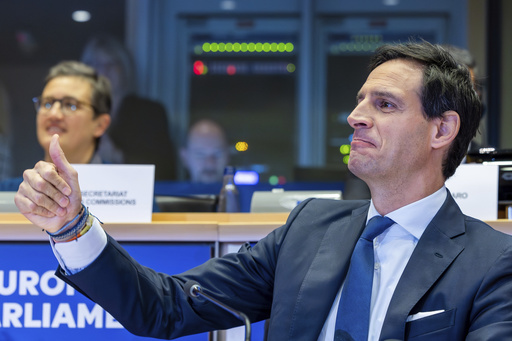
BRUSSELS — The process of evaluating candidates for prominent positions within the European Union hit a snag on Wednesday, as tensions flared within the bloc’s parliament. The largest political faction was accused of forging alliances with right-wing groups, complicating the vetting of the new members for the EU’s executive body, the European Commission.
Since November 4, leading parliamentarians have been scrutinizing the qualifications of 26 individuals nominated to join the European Commission, which plays a pivotal role in guiding EU policies on crucial areas like trade, agriculture, and foreign relations. The hearings concluded on Tuesday, with the commission’s six most senior officials, including President Ursula von der Leyen, being interrogated for three hours. However, votes assessing their suitability were deferred as political friction rose.
Terry Reintke, the leader of the pro-environment Greens, criticized the dominant conservative faction in parliament, accusing them of engaging in “cheap politics and shady maneuvers.” She expressed concern that these strategies are contributing to instability within EU institutions, threatening their functionality and cohesion.
Von der Leyen, who heads the European People’s Party (EPP), continues to lead after the bloc’s elections in June, where the EPP maintained its status as the largest faction. However, centrist groups like the Greens have lost influence as far-right parties have gained traction. This has left the EPP in a position where it can operate largely independently from its traditional allies, with 14 of its members nominated to the commission.
The EPP’s collaboration with hard-right factions—including political entities such as Italy’s Brothers of Italy, led by Prime Minister Georgia Meloni, and Hungary’s Fidesz, headed by Viktor Orbán—has raised eyebrows, particularly regarding the expedited hearing schedule.
The second-largest political group in the parliament, the center-left Socialists and Democrats, strongly criticized the EPP, claiming they violated an agreement meant to keep hard-right parties sidelined. They condemned the EPP for its so-called “irresponsible behavior” in allying with Spain’s populist party Vox to challenge Teresa Ribera, their candidate for one of the EU’s main climate and competition roles, by accusing her of inaction during the recent devastating floods in eastern Spain.
Socialist leaders noted their earlier support for von der Leyen’s re-election was based on a pro-European majority, but expressed concern over the EPP’s recent actions, suggesting they jeopardize the stability of European institutions.
The Greens further asserted their refusal to endorse Raffaele Fitto, an ally of Meloni, for the position of executive vice president overseeing cohesion policy, which is critical for funding infrastructure projects across the EU. Reintke condemned the EPP for its efforts to team up with far-right factions, stating that they are hampering the democratic evaluation of nominees’ skills.
Von der Leyen had aimed to finalize these proceedings so that her new commission could start functioning by early December. As of now, it remains uncertain when the endorsement votes will be rescheduled and which potential allies the EPP might pursue for support.
